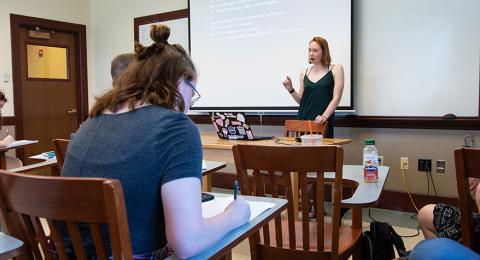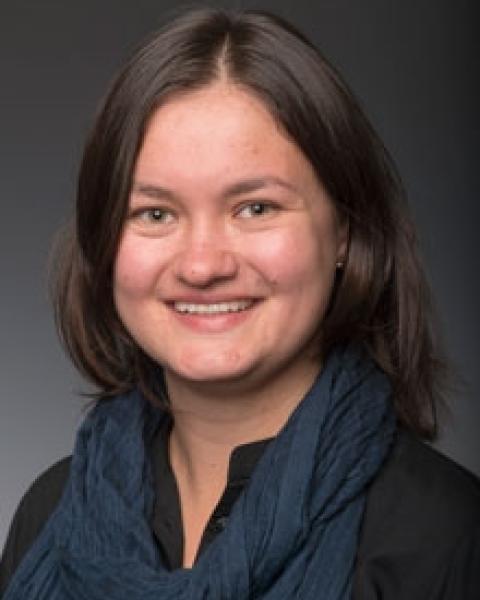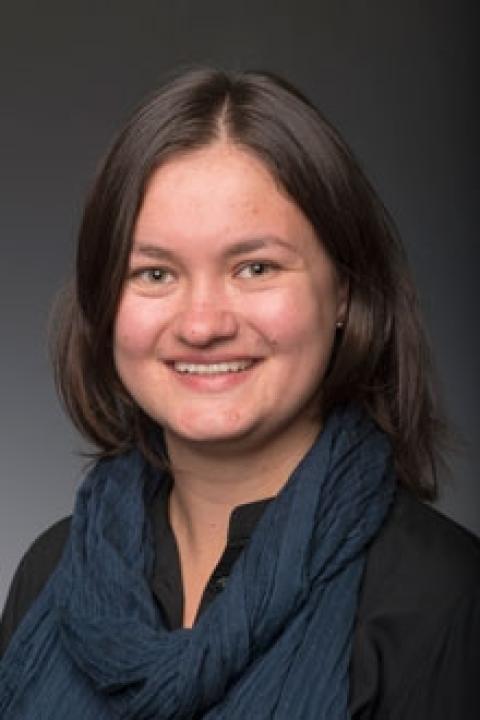The Russian major at UNH introduces students to the Russian language, literature, and culture, covering both historical and contemporary aspects. Students explore Slavic and post-Soviet cultures, gaining cross-cultural skills and broadening their global perspective. The program offers study abroad opportunities in Russian-speaking countries and fosters close interactions with faculty. Students gather regularly in the Russian Club for Russian tea and other activities. Many students pursue double majors, combining Russian with fields like business administration or international affairs, allowing them to apply Russian in their professional careers.
What is Russian?
widespread language of Eurasia. To study Russian is to be introduced to one of the world’s great literatures and cultures. In the Russian degree program, you’ll study the Russian language and its history, reading important works of 19th and 20th century literature. You’ll also explore Russian contemporary society. Discussing Slavic cultures, Russian culture, various cultures inside of Russia and in post-soviet territories will help you understand regional and cultural diversity, build cross-cultural skills and become a global citizen.
Why study Russian at UNH?
spend a summer or semester studying in Russia, and also will have opportunities for internships. You will learn how to apply Russian to your professional field of interest. You’ll be able to interact and work closely with faculty. Throughout the academic year, you may also gather regularly with other students in the Russian Club for Russian tea and activities. Many students in the Russian program pursue a double or dual major in areas such as business administration or international affairs.
Potential careers
- Diplomat
- Foreign service officer
- International Business leader
- Interpreter
- Lawyer
- Translator
- Teacher
Curriculum & Requirements
The Russian program provides students with an opportunity to study one of the world's most important languages, its literature and its culture. In addition to the intrinsic value of Russian language, literature and culture as a liberal arts experience, majoring in Russian leads to a number of careers, such as teaching, translation and interpreting, government and the Foreign Service. The knowledge of the language and cultural proficiency is also a valuable asset in preparing you for careers in law, economics and international trade. All Russian majors are strongly encouraged to double major or include a relevant minor in their studies.
If you would like more information please contact LLC.Dept@unh.edu.
Sample Degree Plan
This sample degree plan serves as a general guide; students collaborate with their academic advisor to develop a personalized degree plan to meet their academic goals and program requirements.
| First Year | ||
|---|---|---|
| Fall | Credits | |
| ENGL 401 | First-Year Writing | 4 |
| Language Major Course | 4 | |
| Discovery Course | 4 | |
| Discovery Course | 4 | |
| First Year Seminar | 1 | |
| Credits | 17 | |
| Spring | ||
| Language Major Course | 4 | |
| Discovery Course | 4 | |
| Major/Minor/Discovery Course | 4 | |
| Major/Minor/Discovery Course | 4 | |
| Credits | 16 | |
| Second Year | ||
| Fall | ||
| Language Major Course | 4 | |
| Discovery Course | 4 | |
| Major/Minor/Discovery Course | 4 | |
| Major/Minor/Discovery Course | 4 | |
| Credits | 16 | |
| Spring | ||
| Language Major Course | 4 | |
| Discovery Course | 4 | |
| Major/Minor/Discovery Course | 4 | |
| Major/Minor/Discovery Course | 4 | |
| Credits | 16 | |
| Third Year | ||
| Fall | ||
| Language Major Course | 4 | |
| Discovery Course | 4 | |
| Major/Minor/Discovery Course | 4 | |
| Major/Minor/Discovery Course | 4 | |
| Credits | 16 | |
| Spring | ||
| Study Abroad (summer and year-long abroad is also available) | 16 | |
| Credits | 16 | |
| Fourth Year | ||
| Fall | ||
| Language Major Capstone Course | 4 | |
| Major/Minor/Discovery Course | 4 | |
| Major/Minor/Discovery Course | 4 | |
| Major/Minor/Discovery Course | 4 | |
| Credits | 16 | |
| Spring | ||
| Language Major Course | 4 | |
| Major/Minor/Discovery Course | 4 | |
| Major/Minor/Discovery Course | 4 | |
| Major/Minor/Discovery Course | 4 | |
| Credits | 16 | |
| Total Credits | 129 | |
Degree Requirements
All Major, Option and Elective Requirements as indicated.
*Major GPA requirements as indicated.
Major Requirements
New students will be assigned to the proper language level course after consultation with the Russian faculty.
Candidates for a degree must satisfy all of the University Discovery Program requirements in addition to satisfying the requirements of each individual major program. Bachelor of arts candidates must also satisfy the foreign language proficiency requirement.
Russian majors may use two major-required courses to satisfy two Discovery category requirements. In addition, Russian majors may take RUSS 521W Devils, Deities, and Madness in Russian Literature to satisfy both a Discovery Inquiry requirement and a major requirement.
Transfer students must earn a minimum of 12 major credits at the Durham campus.
All students must complete at least 10 classes (40 credits). The required minimum overall GPA in major coursework is 2.0. Specific course requirements are:
| Code | Title | Credits |
|---|---|---|
| Language Courses 1 | ||
| Students entering major at a higher language level will replace the language courses with additional electives | ||
RUSS 401 | Elementary Russian I | |
RUSS 402 | Elementary Russian II | |
RUSS 503 | Intermediate Russian I | |
RUSS 504 | Intermediate Russian II | |
RUSS 631 | Advanced Russian Conversation and Composition | |
RUSS 632 | Advanced Russian Conversation and Composition | |
| Electives 2 | ||
| Select a minimum of three courses from the following Culture, Linguistics, and Literature category: | ||
RUSS 521W | Devils, Deities, and Madness in Russian Literature | |
RUSS 525 | Russia: Mythology and Propaganda | |
RUSS 691W | Readings in Russian Literature | |
RUSS 733 | History of Slavic Languages and Culture | |
RUSS 797 | Special Studies in Russian Language, Literature, and Culture | |
LLC 540 | Film History | |
LLC 552 | Comparative Literature: Masterpieces of World Literature II | |
LLC 595 | Language Practicum | |
LLC 791 | Methods of Foreign Language Teaching | |
| Capstone 3 | ||
| LLC 790 | World Languages Capstone | 4 |
| Study Abroad | ||
| Study abroad is a requirement for the Russian major, although an approved equivalent high-impact experience may be substituted for study abroad with a compelling justification. | ||
- 1
While the major may start counting as early as the Elementary I level (RUSS 401), those who enter the major at a higher level (RUSS 503, RUSS 504, RUSS 631, or RUSS 632) will replace the courses they skip from the elementary, intermediate and advanced language category with additional courses from the electives category.
- 2
More electives required if fewer language credits were completed due to proficiency level and placement.
Students are encouraged to take as many of the culture, linguistics, and literature elective in the Russian language as possible, but there is no limit on the number of classes conducted in English from the electives category. Students taking no classes in the target language in a given semester will be strongly encouraged to enroll in one credit of conversation hour to maintain their language skills, and many of the courses taught in English will allow students the option to (or even require students to) do some work in the target language.
- 3
Or approved equivalent 700-level course taken at UNH, approved study abroad equivalent, or approved high-impact experience (such as internship with a robust target language/culture component).
Program Learning Outcomes
- Upon completion of a Russian major, students are able to express themselves orally and in writing on a variety of topics with accuracy, and they are able to support their opinions with evidence found in the media and scholarly reading. Students are able to articulate their ideas and defend their opinions.
- Throughout the language sequence students are expected to give oral presentations on a variety of topics, related to their interest, second major or minor.
- Students have spent at least 8 weeks-semester/year in Russia on a study abroad program, which strengthens their language skills, improves their proficiency, both in language and culturally, and which allows them to interact with native speakers. The major includes at least two courses on Russian literature (one in English and one in Russian), and students are familiar with the works of major Russian authors (i.e. Pushkin, Lermontov, Turgenev, Gogol, Dostoevsky, Tolstoy, Chekhov, Pasternak, Solzhenitsyn, Zoshchenko, Bulgakov, among others.) Students are able to understand the texts in the historical and literary movements of Russia, as well as analyze the works in and of themselves. Students study the cultural history of Russia/Soviet Union/Russia to understand the Russian perspective of itself and the world.
Explore Program Details
Russian majors are required to spend a semester or summer on an approved study abroad program in Russia. UNH Global Education maintains a list of UNH-approved institutions that manage study abroad programs. Check with your major advisor for guidance on an appropriate program for you.
The Program offers a short-study January term course in Moscow that is administered through the COLA Center for Study Abroad.
While there are many useful websites here, this is by no means an exhaustive list. Rather, this list is a beginning step for you to navigate the web for information on Russia, Russian, Russian culture and history.
(be careful not to completely rely on what you read, since context matters)
- Detailed definitions, many word forms
We suggest you look for a transliterated or phonetic font – so that most letters from your keyboard are the same – that is, when you see D on your keyboard, and you type in Cyrillic, you get Д
- Grammar, word of the day, quizzes, exercises, vocabulary.
- Online Russian tutor, language, culture (in English), etc.
- Cases, grammar, verbs, exercises.
- Audio of common word items – spelling and sound.
- Reading and listening modules.
Cornell University - Russian Language Program
Language Institute - University of Wisconsin-Madison
- Russian Advanced Interactive Listening Series
Русская Литература в Интернете / Газеты
Русская Литература в Интернете / Журналы
Аргументы и Факты: новости России и мира
Информация ФСБ России :: Федеральная Служба Безопасности
Good for information about the field of Slavic/Russian studies; job opportunities; what is happening in Russian study around the country.
Каталог@Mail: Каталог интернет сайтов








